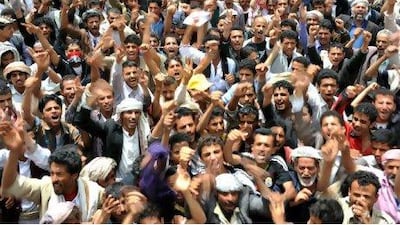ADEN // A bomb killed a military officer loyal to Yemeni president Ali Abdullah Saleh, an official said yesterday, as Yemen's Gulf neighbours sought to avert civil war on their doorstep over the wounded leader's fate.
The Gulf Cooperation Council has tried repeatedly and in vain to broker an exit for Mr Saleh, forced to seek treatment in Saudi Arabia for wounds suffered in an attack on his palace earlier this month, after months of protests against him.
The failure of the most recent bid in May ushered in two weeks of fighting that left parts of the capital in ruins and fanned western and regional fears of Yemen collapsing into chaos and giving al Qa'eda a stronghold alongside oil shipping routes.
The GCC has seen Mr Saleh back out of deals it struck to ease him from office on three occasions. Its members will meet today in Riyadh, almost certainly to discuss Yemen's turmoil, said analysts.
Dubai-based security analyst Theodore Karasik said: "Yemen has to be the number one issue because of what's ongoing there: the power vacuum, who will take over Saleh, what that process is going to look like."
In Burayqa, near Aden, a bomb ripped through the car of Colonel Muti'a al-Sayani, a close relative of a provincial governor who is among Mr Saleh's supporters on Monday.
That city is flooded with refugees fleeing fighting between Yemen's military and Islamist militants who have seized the capital of a neighbouring province, one of the multiple conflicts that Yemen's neighbours fear could shatter the country and embolden the country's al Qa'eda wing.
A US and European-brokered effort to forge a transition agreement between Mr Saleh's deputy, now the acting leader, and opposition parties who demand the president surrender all claims to power immediately, collapsed after the deputy refused to discuss Mr Saleh's fate.
Yemen said on Monday it arrested several people for attempting to kill Mr Saleh, apparently referring to the attack that wounded him. A state newspaper reporting the arrests hinted blame would be placed on a group of opposition parties.
A ceasefire has held in Sana'a since Mr Saleh left after the June 3 attack on his palace, before which fighting between Mr Saleh's forces and those of General Ali al-Mohsen al-Ahmar, who defected in March, killed hundreds of people and forced thousands to flee.
But shortages of fuel, electricity and water are acute in the capital, and violence in the southern province of Abyan, whose capital Islamist gunmen seized last month, has worsened.
Mr Saleh has not been seen in public since the palace attack, which left him with burns and shrapnel wounds. Yemen's ambassador in London said on Saturday that he was stable and recovering. Two members of his cabinet wounded in the attack were in a worse condition and required more surgery.

